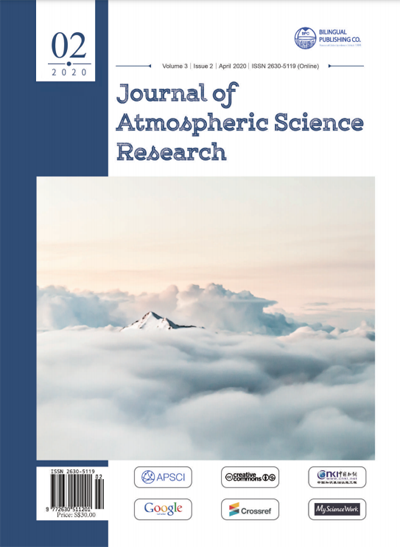-
764
-
389
-
342
-
328
-
303
Understanding the Nexus between Climate Change, the Shift in Land Use toward Cashew Production and Rural Food Security in Ghana; the Experiences of Farmers in the Transition Zone of Ghana
DOI:
https://doi.org/10.30564/jasr.v3i2.2010Abstract
This study summarises the findings from a study investigating rural small-holding farmers’ experiences on the shift from food crop to cashew in the forest/savanna transitional agro-ecological zone of Ghana and its impact on rural food security. Using a mix method approach, the study sampled the views of 400 farmers from 9 farming communities in the Wenchi Municipality of Ghana via questionnaire and semi-structured interview and collated statistical data on crop production to trace the nexus between climate change, agrarian land-use decisions and food security. The study found evidence of increasing shift from food crop to cashew production. This was evidenced by increasing cashew cultivation and cashew output and decreasing total land acreage for food crops and increasing food insecurity of farmers. The findings revealed that about 71% of farmers had expanded their cashew farms and another 41.0% have turned their food crops’ lands to cashew production. Besides cashew production, (57.0%) has overtaken the traditional food crop -maize (25.5%) production in terms of output. Instructively, the study found that the main motivation for the shift from food crop to cashew production is not only to maximise income in bulk, but also climate change adaptability issues. The study found that the cashew crop is resilient in adapting to the changing climate and less prone to pests’ invasion compared to maize in the study District. The study found that food security among rural folks had been seriously compromised by the conversion of farmlands from food crop to cashew farming. Although, the study found that female farmers have higher consciousness to food security yet less motivated to shift from food crop to cashew crop production compared to men. Worryingly, females are the hardest hit group because of their low ownership of or access to farmlands and low voices of women in farmland use decision making in a men-dominant rural extended family setting of the study District. The study concludes that climate change adaptability concern has introduced a new set of risks including crop failure due to changing rainfall pattern and increasing incidence of pest invasions forcing the rural folks to compromise innovative indigenous farming focus and practices that have helped them to navigate extreme food poverty. This study, therefore, argues for improved food crop seeds tailored to the specific climatic context and innovative farming practices that beef-up small-holding farmers’ capacity to navigate climate change to continually produce food crop to ensure rural food security and sustainability.
Keywords:
Rural Ghana; Climate variability; Farmland use; Small-holding farmers; Food security; Women venerabilityReferences
[1] Monteiro F. Catarino L., Batista D. Indjai B., Duarte M. C. and Romeiras M. M. (2017). Cashew as a High Agricultural Commodity in West Africa: Insights towards Sustainable Production in Guinea-Bissau. https://www.mdpi.com/journal/sustainability (accessed 22nd January 2020)
[2] Ghana Statistical Service, National Analytical Report 2010 Population and Housing Census Ghana Statistical Service 2012
[3] Ghana Statistical Service (2015) Composite Budget of the Wenchi Municipal Assembly for 2015 Ghana Statistical Service, 2016
[4] African Cashew Initiative (2010). A Value Chain Analysis of the Cashew Sector in Ghana; Deutsche Gesellschaft für Technische Zusammenarbeit GmbH (GTZ) International Foundations
[5] FAO 2012. Gender inequalities in rural employment in Ghana. An overview. Food and Agricultural Organization. Retrieved from http://www.fao.org/docrep/016/ap090e/ap090e00.pdf access on18.12.08.
[6] Ghana Living Standard Survey- GLSS8, (2018) http://www.statsghana.gov.gh/nada/index.php (assessed on 30th March, 2020)
[7] World Bank. 2013. The World Bank Annual Report 2013. Washington, DC.©World Bank. https://openknowledge.worldbank.org/handle/10986/16091 License: CC BY 3.0 IGO.
[8] Salam, M.A.; Peter, K.V. Cashew-A Monograph; Studium Press (India) Pvt. Ltd.: New Delhi, India, 2010.
[9] Rabany, C., Rullier, N., Ricau, P.(2015). The African Cashew Sector in 2015. Available online: http://www.rongead.org/IMG/pdf/african_cashew_market_review_rongead_ica_2015 (accessed on 14th March 2020).
[10] Dedzoe C.D., Senayah J.K., Assiamah R.D. (2001) Suitable agro-ecologies for cashew (Anacardium Occidentale L.) production in Ghana. West Afr J Appl Ecol 2: 103-115.
[11] Wongnaa C. A.1 and Awunyo-Vitor.D (2013). Profitability analysis of cashew production in Wenchi municipality in Ghana.
[12] Ghana Statistical Service (GSS), (2016). Statistics for Development and Progress: Gros Domestic Product 2014. Retrieved on 12th January 2016 from https://www.statsghana.gov.gh
[13] Anlimachie, M.A & Avoada, C. ( 2020) Socio-Economic Impact of Closing the Rural-Urban Gap in Pre-tertiary Education in Ghana, (in-print), International Journal of Educational Development
[14] Adjei-Nsiah S. and Kermah M., (2012). Climate Change and Shift in Cropping System: From Cocoa to Maize Based Cropping System in Wenchi Area of Ghana. British Journal of Environment & Climate Change 2(2): 137-152.
[15] Adjei V. and Kyerematen R. (2018) Impacts of Changing Climate on Maize Production in the Transitional Zone of Ghana. American Journal of Climate Change, 7, 463-476. https://doi.org/10.4236/ajcc.2018.73028
[16] Khan, H., and Ali, F. (2013). Measurement of Productive Efficiency of Tomato Growers in Peshawar, Pakistan. Agric. Econ. CZECH, 2013, 59, No. 8, p. 381–388. ISSN 0139-570 X.
[17] Amoako-Mensah, T., Anlimachie, A. M., Adu, B. S. & Elorm, E. A. 2019. Out-migration and the Double Jeopardy of rurality in Ghana. An integrated approach to rural development. European journal of geography, 10, 50-67.
[18] Osei-Akoto, S., Topper, C.P., Swatson, E. (2005). Status of cashew production in Ghana and agronomic options for increasing production by smallholder farmers. Paper presented at Ghana Institute of Horticulture Annual Conference.
[19] Adjei V. and Kwantwi L. B. (2019) Maize and Cashew Farming in the Face of Climate Change Variability in the Transitional Zone of Ghana: A Case Study of Nkoranza South Municipality American Journal of Environmental Sciences
Downloads
How to Cite
Issue
Article Type
License
Copyright © 2020 Author(s)

This is an open access article under the Creative Commons Attribution-NonCommercial 4.0 International (CC BY-NC 4.0) License.




 Victor Adjei
Victor Adjei





